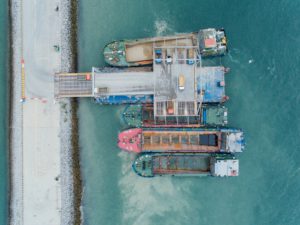The role of trade policy reform in advancing the 2030 Agenda

How is trade treated in the SDG framework, and what are possible avenues through which trade governance reforms could help advance the goals and targets embedded in the 2030 Agenda? Christophe Bellmann, Senior Resident Research Associate at TKE partner, ICTSD, addresses some of these questions.
18 October 2016
In September 2015, the UN General Assembly adopted the 2030 Agenda for Sustainable Development, including a set of 17 Sustainable Development Goals (SDGs) supported by 169 targets and commitments under the Addis Ababa Action Agenda (AAAA). The goals and targets touch upon a broad range of issues, from poverty alleviation and food security to natural resources and clean energy. For the first time, they integrate the economic, social and environmental aspects of sustainable development and recognise their interlinkages. In the next 15 years, the high level of ambition and universal nature of this agenda will guide action by governments and the private sector.
As we move towards implementation, however, generating sufficient resources to reach these aspirational goals will represent a major challenge. In the absence of any specific new financial commitment, international trade as a catalyst for transformative growth is likely to play a critical role in achieving those objectives. The 2030 Agenda largely reflects this view, recognising that trade – if well-regulated – can contribute to sustainable development. To be sure, trade is not considered as an end in itself, but rather as a means to support implementation and advance other SDG targets. In a similar vein, the role of the WTO, as the central institution in global trade governance, is particularly emphasised, with the AAAA calling on the WTO General Council to “consider how the WTO can contribute to sustainable development.”
How is trade addressed under the SDG framework?
The SDGs include a variety of direct and indirect references to trade which can be broadly organised under three groups.
 A first set of references focus on trade governance frameworks. They highlight the need to promote a universal, rules-based, open, non-discriminatory, and equitable multilateral trading system and to conclude negotiations under the Doha Round (17.10). They also recall the need to implement the principle of special and differential treatment (10.a) or to take advantage of existing flexibilities provided by WTO rules in areas such as the trade-related aspects of intellectual property rights (TRIPS) and public health (3.b). The AAAA goes further by highlighting the importance of regional integration and regional trade agreements to promote inclusive growth, while at the same time calling for enhanced coherence among bilateral and regional trade and investment agreements on the one hand and WTO rules on the other (para 87).
A first set of references focus on trade governance frameworks. They highlight the need to promote a universal, rules-based, open, non-discriminatory, and equitable multilateral trading system and to conclude negotiations under the Doha Round (17.10). They also recall the need to implement the principle of special and differential treatment (10.a) or to take advantage of existing flexibilities provided by WTO rules in areas such as the trade-related aspects of intellectual property rights (TRIPS) and public health (3.b). The AAAA goes further by highlighting the importance of regional integration and regional trade agreements to promote inclusive growth, while at the same time calling for enhanced coherence among bilateral and regional trade and investment agreements on the one hand and WTO rules on the other (para 87).
A second group of references includes a series of specific actions and targets on trade and trade policy. These range from enhancing aid for trade and capacity building (8.a), to providing duty-free and quota-free market access for least developed countries (LDCs) (17.12), or doubling the share of LDCs in global exports by 2020 (17.11). Beyond those cross-cutting measures and objectives, the framework also contains sector-specific actions, including the need to correct and prevent trade restrictions and distortions in world agricultural markets (2.b), the prohibition of certain forms of fisheries subsidies which contribute to overcapacity and overfishing (14.6), and the need to provide market access for small-scale artisanal fishers (14.b) or to rationalize inefficient fossil fuel subsidies that encourage wasteful consumption by removing market distortions (12.c). Finally, the agenda envisages a series of cases where trade should be prohibited or restricted as reflected in targets around illegal trade in minerals or efforts to address trafficking in hazardous waste and protected species.
 The third group could be defined as indirect references. Trade is not mentioned explicitly here, but would contribute directly to the achievement of certain goals and targets. This category is probably the largest one, as most, if not all, SDGs are arguably related to trade in a way or another. Examples of such targets include the need to ensure fair and equitable sharing of the benefits arising from the utilisation of genetic resources, a topic directly related to intellectual property rights under the TRIPS agreement (15.6). Sustainable public procurement practices envisaged under goal 12.7 are similarly related to government procurement agreements. Trade in services will be essential to expand access to banking, insurance and financial services (8.10). Trade in environmental goods, services and technologies will play a critical role in promoting access to clean energy (7.a and 9.4) and improving resilience to the impacts of climate change (13.1). Finally, the references to integration into value chains and market diversification (9.3 or 2.3), technology diffusion (8.2), or transborder infrastructure (9.1) arguably are closely linked to trade, trade policy or trade-related technical assistance.
The third group could be defined as indirect references. Trade is not mentioned explicitly here, but would contribute directly to the achievement of certain goals and targets. This category is probably the largest one, as most, if not all, SDGs are arguably related to trade in a way or another. Examples of such targets include the need to ensure fair and equitable sharing of the benefits arising from the utilisation of genetic resources, a topic directly related to intellectual property rights under the TRIPS agreement (15.6). Sustainable public procurement practices envisaged under goal 12.7 are similarly related to government procurement agreements. Trade in services will be essential to expand access to banking, insurance and financial services (8.10). Trade in environmental goods, services and technologies will play a critical role in promoting access to clean energy (7.a and 9.4) and improving resilience to the impacts of climate change (13.1). Finally, the references to integration into value chains and market diversification (9.3 or 2.3), technology diffusion (8.2), or transborder infrastructure (9.1) arguably are closely linked to trade, trade policy or trade-related technical assistance.
How relevant are such trade-related commitments?
As is often the case when cross-cutting action agendas are negotiated, the formulation of specific commitments tends to reproduce language already agreed in other international forums. Indeed, the references to trade – particularly those from the second category – largely reflect previous WTO decisions, ministerial declarations, or other international commitments such as those from the Istanbul Programme of Action for LDCs, and may not appear fundamentally innovative. One could also regret a certain backward-looking conception of trade as illustrated by the limited references to digital trade, trade facilitation, or the close integration of goods, services, investment, and technology in the context of internationally fragmented production networks or global value chains. The lack of emphasis on trade in services as a way to generate value addition, to enhance connectivity, or to boost productivity (e.g. through education, health, or sanitation) is particularly striking in this respect.
Notwithstanding these weaknesses, the SDG trade-related targets remain critical for at least two main reasons. First, recent years have seen a surge in protectionist measures against a background of trade slowdown, with available evidence suggesting that LDCs are particularly affected. According to a recent report by the WTO Secretariat, WTO members applied 154 new trade-restrictive measures between mid-October 2015 and mid-May 2016, amounting to 22 new measures per month – the highest monthly average registered since 2011[1]. In this context, the fairly balanced and overall positive stance on the role of trade for sustainable development highlighted in the SDGs provides a powerful alternative narrative to the anti-trade rhetoric prevailing not only in the US but also increasingly in Europe.

Second, while similar commitments have been made in other forums, global responses to the challenges they attempt to address have largely remained elusive. In several instances, recent developments or policy changes have even increased the urgency to update existing trade rules or elaborate new ones. In agriculture for example, substantial increases in trade-distorting domestic support by large emerging economies and the resurgence of such instruments in the EU and the US have highlighted the need to update agricultural subsidy rules. Over the last five years, the prices of several agricultural commodities have experienced a continuous decline from their 2011 peaks. With food prices reaching their lowest levels since 2006, governments have been under growing pressure to increase tariff protection or provide state aid to guarantee remunerative prices and maintain farm income domestically. Such protectionist policies may in turn push international prices even lower and affect farmers’ livelihood and development prospects in smaller countries which cannot compete with the treasuries of large agriculture players. In a similar vein, the spate of trade remedy disputes around renewable energies such as wind and solar have prompted environmentalists to question the adequacy of existing rules on local content requirements or antidumping measures. Finally, the growing negative environmental externalities associated with resource-depleting subsidies in the area of fisheries or fossil fuels have exposed the limits of current international subsidy disciplines.
How can SDG targets be pursued through trade governance reforms?
Despite the emphasis on the multilateral trading system as a means of implementation, several WTO members including major players seem to have lost interest in WTO negotiations in recent years. Since 2008, many have been exploring alternative pathways to deal with their trade issues, including through the so-called “mega-regional” agreements such as the EU-Japan free trade agreement; the Trans-Pacific Partnership (TPP); or the EU-US Transatlantic Trade and Investment Partnership (TTIP). Yet, the extent to which such mega-deals offer a viable alternative to multilateral negotiations is increasingly questioned. At the time of writing, major uncertainties remain around the prospects for a TPP ratification in the US and political opposition to the TTIP is growing rapidly in France and Germany. In contrast, the success of the last two WTO ministerial conferences, in Nairobi and in Bali, with new agreements being reached in areas such as trade facilitation, tends to prove that progress is possible multilaterally including on issues of direct relevance to the SDG framework such as agricultural export subsidies. Building on these successes, WTO members have the opportunity to advance critical elements of the 2030 Development Agenda through incremental progress at the multilateral level. The SDG framework arguably provides clear negotiating mandates and specific deadlines in a number of areas such as agricultural domestic support, fisheries subsidies, DFQF for LDCs, and – why not – fossil fuels subsidies, even if some may consider these negotiating mandates as external to the WTO.
 Beyond the WTO, advancing the 2030 Agenda might require looking at alternative approaches, including plurilateral or regional solutions. While some fear that such approaches might further fragment the international trade system and discriminate against non-parties, these avenues clearly offer opportunities to address some of the challenges described here. The plurilateral Environmental Goods Agreement, while currently limited in scope, could pave the way for future cooperative arrangements in the area of clean energy. The TPP provides an innovative basis for specific disciplines on a subset of fisheries subsidies which could later on be adopted by a wider set of countries. Other RTAs contain innovative approaches to tackling illegal logging. Finally, the G20 can offer a forum for commitments to reduce fossil fuel subsidies among large economies, leading the way for others to follow. If these initiatives are designed in an inclusive manner, they could form the basis for future cooperation with a larger number of countries. The multilateral system could ultimately provide a forum to multilateralise these innovations once a critical mass of countries have subscribed to them.
Beyond the WTO, advancing the 2030 Agenda might require looking at alternative approaches, including plurilateral or regional solutions. While some fear that such approaches might further fragment the international trade system and discriminate against non-parties, these avenues clearly offer opportunities to address some of the challenges described here. The plurilateral Environmental Goods Agreement, while currently limited in scope, could pave the way for future cooperative arrangements in the area of clean energy. The TPP provides an innovative basis for specific disciplines on a subset of fisheries subsidies which could later on be adopted by a wider set of countries. Other RTAs contain innovative approaches to tackling illegal logging. Finally, the G20 can offer a forum for commitments to reduce fossil fuel subsidies among large economies, leading the way for others to follow. If these initiatives are designed in an inclusive manner, they could form the basis for future cooperation with a larger number of countries. The multilateral system could ultimately provide a forum to multilateralise these innovations once a critical mass of countries have subscribed to them.
ICTSD recently published a more detailed paper on trade in the 2030 Agenda entitled Trade in Transforming Our World: Options for Follow-up and Review of the Trade-related Elements of the 2030 Agenda for Sustainable Development, as well as a series of think pieces exploring specific aspects of this relationship, including poverty reduction, food security, and gender equality. Other think pieces on climate change, health, and natural resources will follow.
Author: Christophe Bellmann, Senior Resident Research Associate at the International Centre for Trade and Sustainable Development (ICTSD).
[1] See: WT/TPR/OV/W/10, WTO, 4 July 2016
This article is originally from the website of TKE partner, ICTSD. It was published in their monthly review focused on trade and sustainable development issues in Africa, Bridges Africa (Volume 5- Number 8, “Trade as a tool to achieve the SDGs in Africa” ).